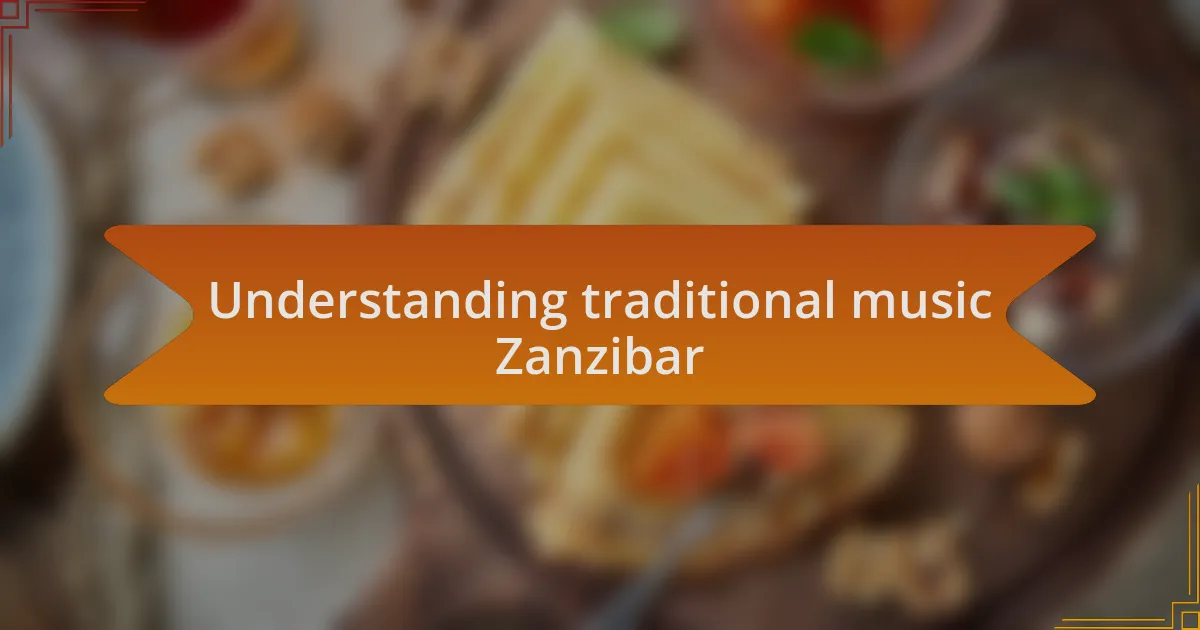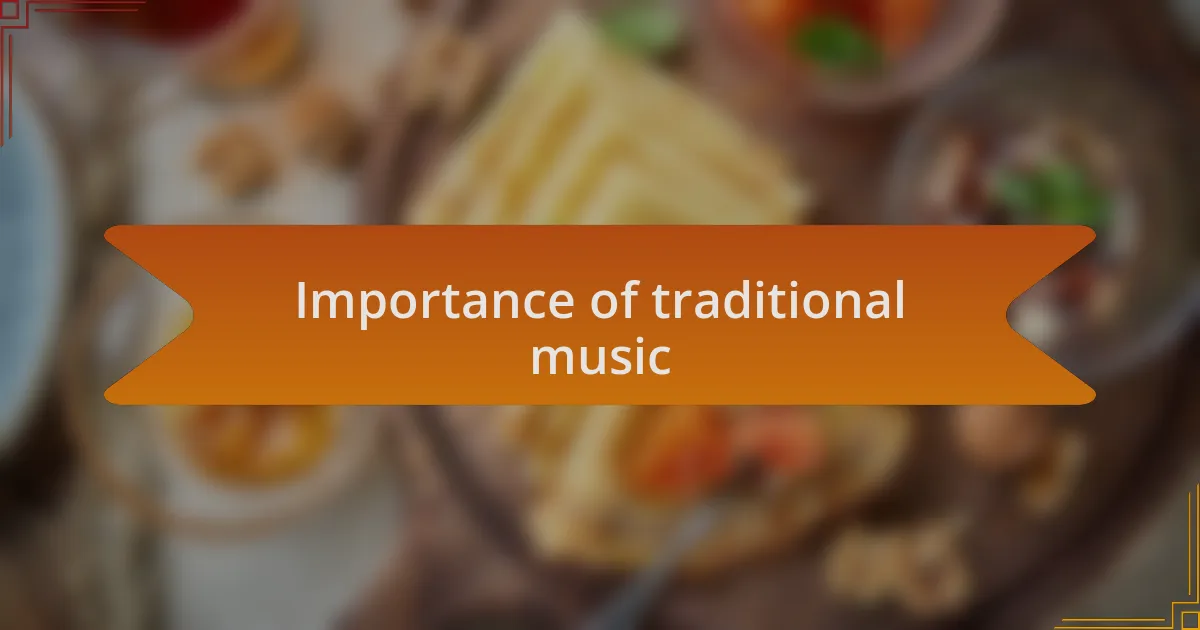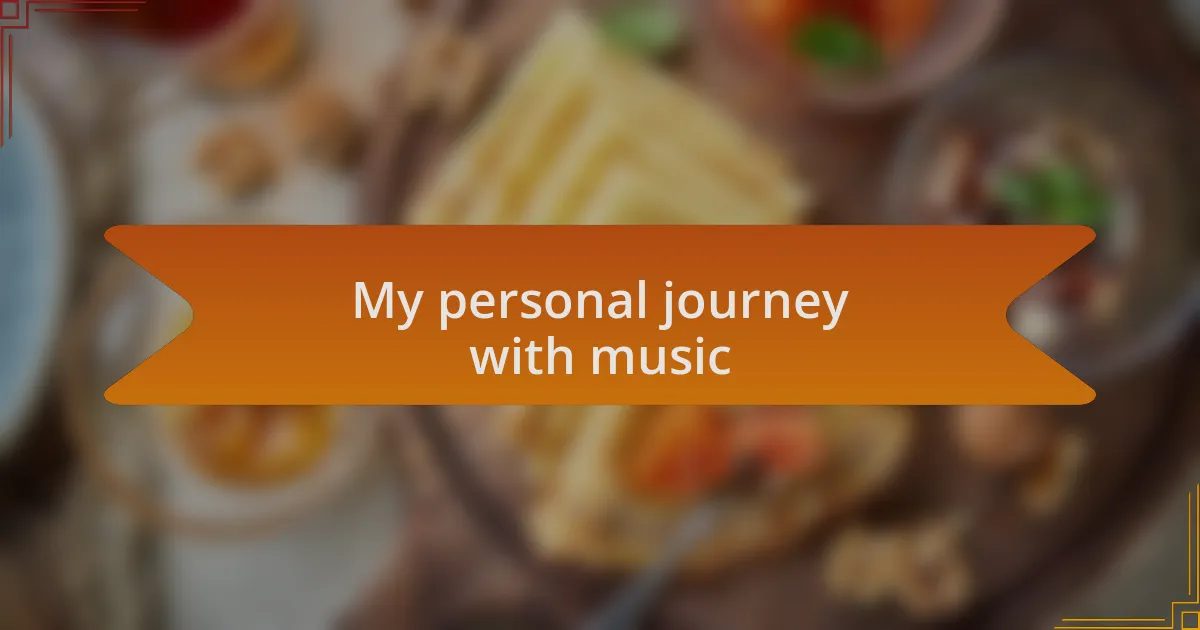Key takeaways:
- Traditional music in Zanzibar reflects the island’s complex history and cultural identity, blending African and Arabic influences.
- Music serves as an emotional conduit for the Zanzibari people, connecting generations and addressing communal struggles and joys.
- Drone mapping enhances the understanding of cultural landscapes, offering unique perspectives and aiding in cultural preservation.
- The author’s personal journey with Zanzibar’s traditional music deepened their appreciation for shared experiences and cultural connections.

Understanding traditional music Zanzibar
In Zanzibar, traditional music serves as a vibrant thread weaving through the island’s rich cultural tapestry. I still remember the first time I stumbled upon a spontaneous taarab performance in Stone Town — the way the musicians effortlessly blended the lilting sounds of the oud with the rhythmic beats of the taarab drums transported me. Haven’t you ever felt that pulse of music resonate in your soul, making you feel truly alive?
The genres of music here tell stories of love, loss, and life itself, deeply rooted in Swahili culture. Each note feels like a whisper from the past, inviting you to listen closely. I was particularly moved by a intimate gathering where an elder shared songs that echoed struggles and victories from generations before. It made me ponder: how much of our own history do we express through music?
Moreover, traditional music in Zanzibar isn’t just entertainment; it’s a way of preserving identity. I found myself reflecting on how the melodies captured the essence of the island’s diverse influences — from African rhythms to Arabic melodies. You might wonder how such a blend can exist so harmoniously, but it’s a testament to the resilience and adaptability of the Zanzibari people. The music speaks volumes about their heritage and pride, binding communities together through shared rhythms and verse.

Importance of traditional music
Traditional music holds a vital place in the heart of Zanzibar, acting as a mirror reflecting the island’s complex history and cultural identity. During one late afternoon, ensconced in a lively courtyard, I felt a wave of nostalgia wash over me as local musicians played songs that celebrated the community’s shared experiences. It struck me that each strum and beat was like a thread connecting generations, binding individuals to their ancestors’ stories and struggles.
Additionally, these musical expressions serve as an emotional conduit for the collective consciousness of the Zanzibari people. I remember listening to a seasoned musician speak about how certain melodies emerged during difficult times, offering solace and inspiration. It made me realize: can we truly appreciate a culture without understanding its songs?
Moreover, as I actively participated in a dance that accompanied the music, the energy coursing through the crowd was palpable. Each movement seemed to echo stories of joy, unity, and resilience. In that moment, I could feel the music enveloping us all, creating a sense of belonging and community that reminded me of the universal power of traditional music.

Overview of drone mapping
Drone mapping is transforming the way we capture and analyze landscapes, especially in places with rich cultural heritage like Zanzibar. I remember my first encounter with a drone hovering above the vibrant spice markets; the aerial view revealed intricate patterns and structures that I hadn’t noticed before. It was fascinating to see how technology could uncover layers of history embedded within the geography.
This technique provides detailed imagery and mapping capabilities that are invaluable for urban planning and cultural preservation. As I observed researchers using drone maps, I marveled at the accuracy and efficiency of data collection. Doesn’t it make you think about the possibilities for documenting places that hold significant historical value?
Moreover, drone mapping facilitates accessibility to hard-to-reach areas, allowing for comprehensive surveys of cultural sites without disturbing their integrity. I experienced a profound sense of connection when viewing the footage from a recent mapping project; it was as if I was soaring over not just a landscape, but a living history. The integration of drones in exploring cultural landscapes is inspiring and opens up new avenues for understanding the stories that these places tell.

My personal journey with music
Music has always been a vital part of my life, and my journey through traditional music in Zanzibar ignited a passion I didn’t know I had. One evening, as I wandered through a bustling street, the enchanting sound of taarab music drew me in. I felt an irresistible pull towards a small, open-air venue, where I experienced the captivating blend of rhythms and lyrics that spoke to the soul of the island.
As I listened to the musicians, the melodies seemed to weave a tapestry of stories from decades past. It was during this moment that I truly connected with the essence of Zanzibar’s culture. Have you ever had a moment when you realized that a piece of music was speaking directly to you? For me, that night marked the beginning of a deep appreciation for the way traditional sounds can transcend time and place, forging a personal connection with history.
Over the months, I immersed myself in local festivals and gatherings, where the energy of live performances resonated in the air. I recall dancing with newfound friends, laughing as the rhythms compelled us to move in unison. Every beat felt like an invitation to share in a collective joy, reinforcing my belief that music is not just sound; it is a shared experience that binds us together across different cultures and backgrounds.